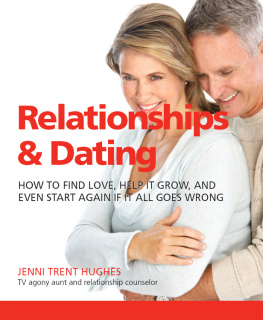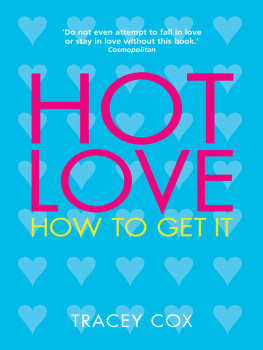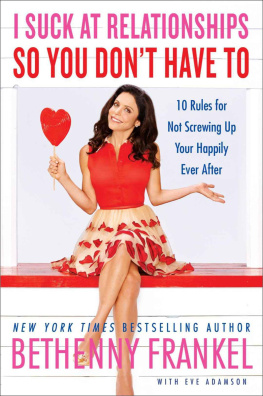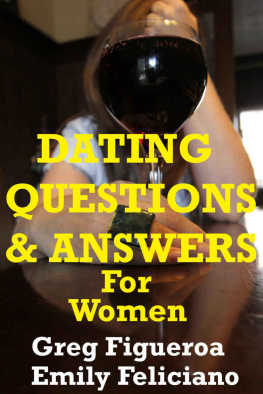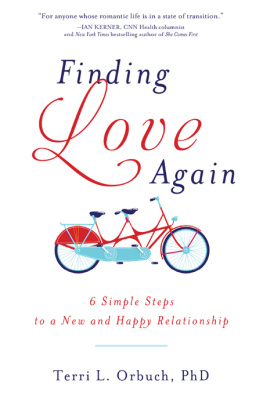LOVE BY NUMBERS
DR LUISA DILLNER is publishing director for new product development at the British Medical Journal Publishing Group. Published by the Guardian, Observer, Sunday Telegraph, Cosmopolitan, Vogue and Elle, she has also written for the famous Mumsnet website. She has four children, lives in London and most importantly has a perfect long term relationship.
LOVE BY NUMBERS
The hidden facts behind
everyones relationships
DR LUISA DILLNER

First published in Great Britain in 2009 by
PROFILE BOOKS LTD
3A Exmouth House
Pine Street
London ECIR OJH
www.profilebooks.com
This eBook edition published in 2010
Copyright Luisa Dillner, 2009
The moral right of the author has been asserted.
This book is published in association with Guardian Books. Guardian Books is an imprint of Guardian News & Media Limited. The Guardian is a registered trademark of Guardian Media Group plc.
This eBook is copyright material and must not be copied, reproduced, transferred, distributed, leased, licensed or publicly performed or used in any way except as specifically permitted in writing by the publishers, as allowed under the terms and conditions under which it was purchased or as strictly permitted by applicable copyright law. Any unauthorised distribution or use of this text may be a direct infringement of the authors and publishers rights and those responsible may be liable in law accordingly.
A CIP catalogue record for this book is available from the British Library.
eISBN 978 1 84765 329 1
For John, Sam, Madeleine, Mathilda, Lydia and my Mum;
all helped me to write this book
Contents
Introduction
This isnt a self-help book about relationships, so it wont tell you what to do. What it will do is answer, using facts and figures, many of the questions people have about relationships; and once you have this information, you can work most things out for yourself.
When I was a single parent with two children, I used to wonder if Id ever meet someone new. It seemed unlikely, even without taking into account how useless I was (then) at relationships. Then one day I came across a newspaper report that said that 70 per cent of single parents were likely to find a new partner within five years. I was so surprised that I tore it out. It had never occurred to me that thered be an answer to the question, Will I meet someone? Id thought it was down to chance, not that someone could make a well-informed prediction. Having prepared myself for years of maternal sacrifice I found myself thinking I was more likely to meet someone than not to. Maybe if the statistics said I would, I didnt even need to try. As it happens I met my partner at a friends party (a good place, so the research tells us, but I have to thank my friend Janice who insisted I get out there) and have been with him ever since.
It was finding this statistic that made me wonder how much research there was about all the eternal, and unusual, questions about relationships: will I meet someone, should we move in together, should I have had that one-night stand, and so on. Id been working as a doctor, firstly in hospitals and then for the British Medical Journal, and everyone was talking about evidence-based medicine. There was a big push for doctors to make sure they were treating people on the basis of the best research evidence. If this was such a good thing, why, I wondered, didnt we use it to inform other areas of our lives? When I heard people telling their friends what to do about their boyfriends, husbands, wives or girlfriends, I couldnt help thinking, But how do you know?
We may think that our feelings about relationships, and especially love, are unique that no one goes through what were going through. How we feel about Tom, Dick or Harriet is sometimes (especially to our friends) inexplicable. But even so well often sound out our friends, who are usually game enough to offer an opinion, based mostly on their sometimes limited experience. What we may not realize is that there are lots of research studies that show what happened not just to a couple of people but sometimes hundreds, who have had similar relationship dilemmas to the ones were having. Research in these areas occasionally makes it into the broadsheet pages of the national press, but the vast majority of similar findings are not known to the public.
When I started writing the Guardian column Love by Numbers, on which this book is based, instead of just giving an opinion like traditional agony aunt columns, I wanted to see if I could provide quantitative answers. And looking for research about relationships, I was surprised how much there was and how quirky some of it was. There is research on whether men will leave their partners for their mistresses (they usually wont), whether open marriages make people happier (they dont), and how often attempts to poach someone are successful (around 50 per cent of the time). Researchers, mostly social psychologists, have hidden in park bushes to see whether couples without children are more affectionate to each other than lovers encumbered by kids (they are). They have scanned college yearbooks to see whether women who smile in their photo are happier in their relationships than those who dont (they are). And then there are the relationship experts like John M. Gottman, who watches couples in his love lab, identifying precisely the ones most likely to split up by listening for just a few minutes to how they talk to each other and applying a mathematical formula.
Some of the conclusions seemed obvious, but most of it was surprising. Perhaps the most surprising thing is that the research, from academic journals (such as the Journal of Personality and Social Psychology, the Journal of Marriage and Family and Sex Roles), think tanks, government reports and statistical offices, answers the everyday questions we all have about relationships. Does having children ruin them? Whats the best way of finding someone? Do opposites attract? Is there such a thing as a soul mate?
Not all research is created equal: papers vary in quality, and some samples are more representative than others (psychologists have a habit of using their students for research, and they are not always like the rest of us). The research in this book is international, but a lot of it comes from America and Britain because many of the research centres and journals are based in these countries. Ive tried to include the most useful evidence and to describe any shortcomings it might have. Sometimes the evidence comes from surveys, and its hard to know who will have taken part. Even the best studies have their limitations, and their findings can only give you more information not a definitive answer. But often knowing what has happened to other people can shed some light on what might happen to you and what you can do about it.
Many of the letters I get sent for the Guardian column are about sex, often from men saying theyre not getting enough (which makes you wonder if any men ever do). One letter was from a woman saying that now shed had a baby, her husband wanted more sex to make up for the time theyd lost. I just want to sleep, she wrote. I dont like to ask what the mothers in playgroup are doing. Its a shame she didnt know, because theyre almost certainly doing the same as she is having less sex than they used to. If men dont ever get enough sex, women dont ever get enough help with childcare and the housework. And guess what the two, as well see, are related.
Next page


